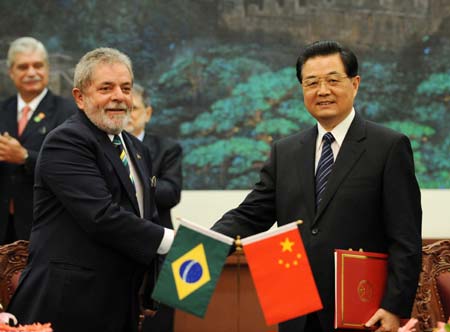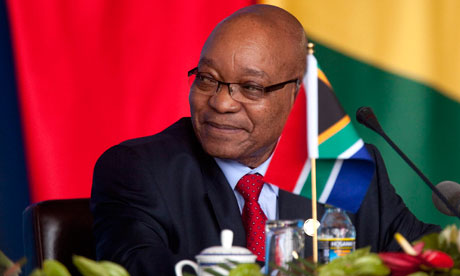The Obama administration is trying to play catch-up in its relations with the country that could become its most important long-term ally. But it may be leaving it too late, after India last week agreed a $7 billion deal in arms, nuclear reactors and space technology with Russia.
India's strategic importance can hardly be exaggerated. More than just the other Asian economic giant after China, India is a democracy where English is an official language. It shares with Washington the same love-hate attitude toward China, hopeful but deeply suspicious at the same time. And with a much healthier demographic profile than China, most extrapolations of long-term trend suggest that India's economy will outgrow China's by the second half of this century.
U.S. President Barack Obama himself seems to have understood this. The first state dinner he hosted was for India's Prime Minister Manmohan Singh. And then were strong foundations on which to build. His Democratic predecessor Bill Clinton had started the courtship of India in the 1990s and President George W. Bush's commitment to India was one of the few successes of his troubled foreign policy.
Bush's legacy was a nuclear cooperation agreement, which allowed India to escape the nuclear isolation into which it was plunged after testing a nuclear weapon outside the Non-Proliferation Treaty. Bush's deal also opened the way for the United States to sell nuclear power stations, fuel and other technology to India and to forge a lasting strategic partnership.
But for a host of reasons the Obama administration has let India slip down the list of its priorities. Not all of these reasons relate to Islamic terrorism, the war in Afghanistan and consequent urge to focus on Pakistan.
The economic crisis has emphasized China's importance, as the country with the biggest trade surplus with the United States and as the second leading holder of U.S. securities after Japan. China's diplomatic role, as a member of the U.N. Security Council and thus wielding a veto, has also underlined China's pivotal position in U.S. attempts to curb the nuclear ambitions of Iran and north Korea.
India understandably chafes at the sense that it plays second fiddle in Washington, lacking that network of institutional ties and official relationships that cement connections to other leading powers.
"The U.S.-Indian relationship remains constrained," notes Evan Feigenbaum, senior fellow for Asia at the Council on Foreign Relations and former U.S. deputy assistant secretary of state for South Asia and Central Asia. "Although U.S. officials hold standing dialogues about nearly every region of the world with their counterparts from Beijing, Brussels and Tokyo, no such arrangements exist with New Delhi."
Other states, notably Russia, have not led India slip to the back burner. Last week's visit to New Delhi of Russia's Prime Minister Vladimir Putin has seen the signing of a number of strategic deals. They included an aircraft carrier, MiG-29 fighters, defense and space technology and at least 12 civilian nuclear reactors. Putin also said he wanted the current $8 billion in annual trade with India to more than double to $20 billion.
The deal to buy the Soviet aircraft carrier Admiral Gorshkov has been in the works for years, delayed by the need for an almost complete overhaul of the ship and by haggling over the terms. The initial price tag was $1.5 billion, which Russia increased to $2.5 billion but has now settled for $2.3 billion, to include its complement of 45 MiG-29 warplanes.
This is still a fraction of the price of an air fleet-equipped modern U.S.-built carrier, even if one were available, or even of the smaller British and French carriers now being developed. But India's current carrier, the Viraat, is the former British vessel HMS Hermes, built in 1959. Obsolete and usually in dock, its obsolescence means India needs another carrier quickly if it is to maintain the complex skills essential to carrier deployment. India's first domestically produced carrier, the Vikrant, now under construction in Cochin, is unlikely to be operational before 2015.
What Putin did not get was any commitment that India would pick Russian warplanes for its planned $11 billion purchase of 126 state-of-the-art fighters, intended to give the country's air force the technological edge over China and Pakistan in the current Asian arms race. It is the deal that everyone wants to win, from the Eurofighter to Boeing's Super Hornet and Russia's MiG-35.
But that arms deal is just a fraction of the estimated $150 billion that India will be sending on energy technology, from nuclear reactors to oil and gas exploration and wind and solar. American hopes of winning a major slice of these contracts have been stalled over an elusive agreement on reprocessing nuclear fuel.
Robert Blake, the senior State Department official dealing with India and its region, is hopeful that a deal can be concluded by this summer. Indian officials are less optimistic and query U.S. insistence that India's parliament enact a limited liability rule on compensation for nuclear accidents, an issue that does not seem to worry Russian and French suppliers.
There is a pattern here. Two far-reaching agreement on U.S.-Indian military cooperation have stalled, as have other projects for hi-tech and space research cooperation.
The real problem is fundamental. Indians complain that the Obama administration still sees India less as a great power in its own right, than as a walk-on player in two issues that worry Washington more. The first is the Afghan-Pakistan imbroglio and the second is U.S.-China relations. Obama's suggestion, during his cap-in-hand visit to Beijing, that China help the United States "manage" the Indo-Pakistan problem "led to the mistrust of Obama that today pervades the Indian establishment," argues influential Indian commentator Professor Madhav Nalapat.
"President Obama's policy of downgrading India to the level of a South Asian power is pushing Delhi closer toward Moscow and Beijing," Nalapat adds." If such an axis takes place, the 'credit' will go to the Obama administration. India sees itself as an Asian power with a global focus. Those unwilling to accept this cannot be defined as friends."




 Reply With Quote
Reply With Quote









Bookmarks